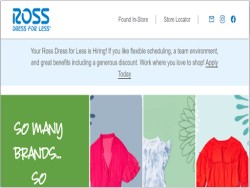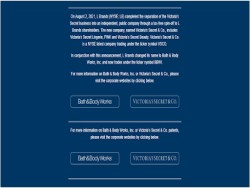The top companies in department/specialty retail stores are Walmart, Target, Macy’s, Home Depot, and Best Buy. The market is a diverse industry that offers a wide range of products and services.
Department stores offer products in different categories, while specialty stores offer a wider range of products within a specific category. According to Statista, the total revenue of the top 10 department/specialty companies in the US is approximately $231 billion.
Overview of the Department/Specialty Retail Stores Market
Department/specialty retail stores offer a variety of products and services to consumers. From fashion, electronics, home goods, to children toys, they have a broad range of products within each category. They also often provide additional services, like installation and repair for certain products. These retailers also often offer promotions and discounts, making their products more affordable for consumers.
Consumers can physically browse and compare products in-store before making a purchase, allowing them to make informed buying decisions. Some department/specialty retail stores have also adapted to the rise of e-commerce by offering their products online. This gives consumers the flexibility they need in making purchases.
Many retailers have implemented digital solutions, such as mobile apps and self-checkout kiosks, to enhance the shopping experience for customers. Some have also experimented with virtual and augmented reality technology to allow customers to virtually try products in their homes.
Types of Companies in Department/Specialty Retail Stores
Department stores
Department stores are large retail establishments that offer various categories of products known as “departments”. These include fashion, home goods, electronics, and cosmetics, etc.
These stores typically offer a higher-end shopping experience and carry brands that are not always available in other retail stores.
Specialty stores
Specialty stores are retail establishments that focus on a specific product category or niche. Examples of specialty stores are bookstores, pet stores, sporting goods stores, etc.
They have a narrower product range than department stores, but they may offer a greater depth of products within their specific category. Specialty stores often have knowledgeable staff to provide specialized advice and recommendations to customers.
Discount stores
Discount stores offer products at lower prices than traditional retail stores. They are also known as off-price retailers, offering limited-time promotions and clearance sales to entice customers.
Superstores
Superstores are large retail establishments that combine elements of department stores and grocery stores. In addition to groceries, electronics, home goods, and clothing, Superstores may also offer in-store pharmacies banking and other services.
Warehouse clubs
Warehouse clubs are membership-based retailers that offer bulk products at discounted prices. They require a membership fee to access their products, but customers can save money by purchasing items in larger quantities.
Top 20 Companies in Department/Specialty Retail Stores
Top 20 companies leading the department/specialty retail stores market:

Size: 1.3 million employees
Headquarters: Seattle, Washington, USA
Amazon was established in1994 by Jeff Bezos, and the current CEO is Andy Jassy. Its current market capitalization is $1.5 trillion. Amazon is majorly an online retailer, with physical stores in select locations, serving a total of over 200 million Amazon Prime members. Some of its services/products include e-commerce, streaming services, smart home devices, and cloud computing. It also offers employees the best career paths in department/specialty retail stores.
-
Walmart
Size: 2.3 million employees
Headquarters: Bentonville, Arkansas, USA
Walmart was established in 1962 by Sam Walton, and the current CEO is Doug McMillon. With a current market capitalization of $399.5 billion, Walmart offers services/products such as general merchandise, groceries, pharmacy, and financial services. It serves over 265 million customers weekly, in 10,500 stores located in 27 countries.
-
The Home Depot
Size: 500,000 employees
Headquarters: Atlanta, Georgia, USA
The Home Depot was established in 1978 by Bernard Marcus, Arthur Blank, Ron Brill, and Pat Farrah. The current CEO is Craig Menear. With a current market capitalization of $359.3 billion, its services/products include Home improvement products and services, building materials, and tools.
The Home Depot serves over 4 million customers daily, with outlets of over 2,200 stores in the United States, Canada, and Mexico.
-
Costco
Size: 273,000 employees
Headquarters: Issaquah, Washington, USA
Costo was established in 1983 by James Sinegal and Jeffrey Brotman. Its current CEO is Craig Jelinek. With a current market capitalization of $166.4 billion, its services/products include membership-based warehouse club, bulk groceries, electronics, and clothing. Costo serves over 110 million members, with 800 warehouses located in 12 countries.
-
Lowe’s
Size: 310,000 employees
Headquarters: Mooresville, North Carolina, USA
Lowe’s was established in 1946 by Lucius Smith Lowe. Its current CEO is Marvin Ellison. With a current market capitalization of $140.7 billion, its services/products include home improvement products and services, building materials, and tools. Lowe’s customers process over 18 million transactions weekly, in 2,200 stores across the United States and Canada.
-
Target
Size: 360,000 employees
Headquarters: Minneapolis, Minnesota, USA
Target was established in 1902 by George Dayton. Its current CEO is Brian Cornell. With a current market capitalization of $116.8 billion, its services/products include general merchandise, groceries, clothing, and home furnishings. Target serves over 30 million customers weekly in 1,900 stores across the United States.
-
TJX Companies
Size: 320,000 employees
Headquarters: Framingham, Massachusetts, USA
TJX Companies was established in 1956 by Bernard Cammarata and Stanley Feldberg. Its current CEO is Ernie Herrman. With a current market capitalization of $89.2 billion, its services/products include off-price retail chain, discount clothing, home goods, and accessories. TJX Companies serves customers in over 4,500 stores across the United States, Canada, Europe, and Australia.
-
Dollar General
Size: 157,000 employees
Headquarters: Goodlettsville, Tennessee, USA
Dollar General was established in 1939 by James Luther Turner and Cal Turner. Its current CEO is Todd Vasos. With a current market capitalization of $59.5 billion, its services/products include discount retail, general merchandise, household items, and groceries. Dollar General serves over 17 million customers weekly in 17,000 stores across the United States.
-
Dollar Tree
Size: 195,000 employees
Headquarters: Chesapeake, Virginia, USA
Dollar Tree was established in 1986 by Macon F. Brock Jr., Doug Perry, and Ray Compton. Its current CEO is Michael Witynski. With a current market capitalization of $26.7 billion, its services/products include discount retail, household items, snacks, and beauty products. Dollar Tree serves over 15 million customers weekly in 15,000 stores across the United States and Canada.
-
Ross Stores

Size: 82,700 employees
Headquarters: Dublin, California, USA
Ross Stores established in 1982 by Stuart Moldaw, Morris Ross, and Bill Isackson. Its current CEO is Barbara Rentler. With a current market capitalization of $45.9 billion, its services/products include off-price retail chain, discount clothing, home goods, and accessories. Ross Stores serves customers in over 1,800 stores across the United States, Canada, and Europe.
-
Best Buy
Size: 125,000 employees
Headquarters: Richfield, Minnesota, USA
Best Buy was established in 1966 by Richard Schulze and Gary Smoliak. Its current CEO is Corie Barry. With a current market capitalization of $33.7 billion, its services/products include consumer electronics, appliances, home theater systems, and mobile devices. Best Buy receives over 100 million unique website visitors monthly, and has over 1,000 stores across the US and Canada.
-
The Kroger Company
Size: 435,000 employees
Headquarters: Cincinnati, Ohio, USA
The Kroger Company was established in 1883by Bernard Kroger. Its current CEO is Rodney McMullen. With a current market capitalization of $29.6 billion, its services/products include grocery stores, supermarkets, pharmacies, jewelry, and electronics. The Kroger Company serves over 11 million customers daily in 2,750 stores across the United States.
-
The Gap
Size: 129,000 employees
Headquarters: San Francisco, California, United States
The Gap was established in 1969 by Donald Fisher and Doris F. Fisher. Its current CEO is Sonia Syngal. With a current market capitalization of $12.3 billion, they offer clothing and accessories for men, women, and children. The Gap has over 3,000 stores worldwide, serving millions of customers annually.
14. Williams-Sonoma
Size: 12,800 employees
Headquarters: San Francisco, California, USA
Williams-Sonoma was established in 1956 by Charles E. Williams and Chuck Williams. Its current CEO is Laura Alber. With a current market capitalization of $13 billion, its services/products include home furnishings, kitchenware, and home décor. Williams-Sonoma serves over 3 million customers yearly, in 600 stores across the United States, Canada, and Australia.
15. L Brands

Size: 39,100 employees
Headquarters: Columbus, Ohio, United States
L Brands was established in 1963 by Leslie Wexner. Its current CEO is Andrew Meslow. With a current market capitalization of $16.3 billion, L Brands focuses on women’s intimate apparel, personal care, and beauty products. The company’s portfolio of brands includes Victoria’s Secret, Bath & Body Works, and Pink. L Brands has over 2,700 stores worldwide, as well as a significant online presence through its e-commerce platform.
16. Foot Locker
Size: 15,000 employees
Headquarters: New York, New York, United States
Foot Locker was established in 1974 by F.W. Woolworth. Its current CEO is Richard Johnson. With a current market capitalization of $3.7 billion, Foot Locker offers athletic footwear and apparel for men, women, and children. They operate over 3,000 stores worldwide, as well as an e-commerce platform that allows customers to shop from anywhere.
-
Bed Bath & Beyond
Size: 55,000 employees
Headquarters: Union, New Jersey, USA
Bed Bath & Beyond was established in 1971 by Leonard Feinstein and Warren Eisenberg. Its current CEO is Mark Tritton. With a current market capitalization of $3.1 billion, its services/products include home goods, kitchenware, and bath accessories. Bed Bath & Beyond serves 30 million customers yearly over 1,500 stores across the United States and Canada.
18. Macy’s
Size: 130,000 employees
Headquarters: New York, USA
Macy’s was established in 1858 by Rowland Hussey Macy. Its current CEO is Jeff Gennette. With a current market capitalization of $4.4 billion, its services/products include department stores, clothing, accessories, and home goods. Macy’s serves over 20 million customers yearly in 550 stores across the United States.
19. Michaels
Size: 42,000 employees
Headquarters: Irving, Texas, United States
Michaels was established in 1973 by Michael J. Dupey. Its current CEO is Ashley Buchanan. With a current market capitalization of $1.8 billion, Michaels offers arts, crafts, and home decor products. They operate over 1,200 stores throughout the US and Canada, as well as an e-commerce platform.
20. The Children’s Place

Size: 14,900 employees
Headquarters: Secaucus, New Jersey, United States
The Children’s Place was established in 1969 by David Pulver and Clinton Clark. Its current CEO is Jane Elfers. With a current market capitalization of $1.2 billion, The Children’s Place offers clothing and accessories for children. They operate over 1,000 stores throughout the US and Canada, as well as an e-commerce platform.
The table below summarizes these top 20 companies in department/specialty retail stores:
| S/N | Company Name | Headquarters | Number of Employees | Current Market Capitalization |
| 1 | Amazon | Seattle, WA | 1.3 million | $1.5 trillion |
| 2 | Walmart | Bentonville, AR | 2.3 million | $399.5 billion |
| 3 | Home Depot | Atlanta, GA | 500,000 | $359.3 billion |
| 4 | Costco | Issaquah, WA | 273,000 | $166.4 billion |
| 5 | Lowe’s | Mooresville, NC | 310,000 | $140.7 billion |
| 6 | Target | Minneapolis, MN | 360,000 | $116.8 billion |
| 7 | TJX Companies | Framingham, MA | 320,000 | $89.2 billion |
| 8 | Dollar General | Goodlettsville, TN | 157,000 | $59.5 billion |
| 9 | Dollar Tree | Chesapeake, VA | 195,000 | $26.7 billion |
| 10 | Ross Stores | Dublin, CA | 82,700 | $45.9 billion |
| 11 | Best Buy | Richfield, MN | 125,000 | $33.7 billion |
| 12 | Kroger | Cincinnati, OH | 435,000 | $29.6 billion |
| 13 | The Gap | San Francisco, CA | 129,000 | $12.3 billion |
| 14 | Williams-Sonoma | San Francisco, CA | 12,800 | $12.4 billion |
| 15 | L Brands | Columbus, OH | 39,100 | $16.3 billion |
| 16 | Foot Locker | New York, NY | 15,000 | $3.7 billion |
| 17 | Bed Bath & Beyond | Union, NJ | 55,000 | $3.1 billion |
| 18 | Macy’s | New York, NY | 130,000 | $4.4 billion |
| 19 | Michaels | Irving, TX | 42,000 | $1.8 billion |
| 20 | The Children’s Place | Secaucus, NJ | 14,900 | $1.2 billion |
What are the 5 Key Sectors of the Department/Specialty Retail Stores?
The department/specialty retail stores have many jobs available in different sectors.
The 5 key sectors of department/specialty retail stores are:
-
Fashion and apparel
This sector includes clothing, footwear, and accessories, and encompasses both high-end fashion retailers as well as more affordable fashion retailers.
-
Home goods and décor
This sector includes furniture, bedding, home accessories, and decorative items.
-
Electronics and appliances
This sector includes consumer electronics, home appliances, and related accessories.
-
Beauty and personal care
This sector includes skincare, makeup, haircare, and other personal care products.
-
Sports and outdoor
This sector includes athletic apparel, equipment, and footwear, as well as outdoor gear and camping supplies.
How to Get a Job Offer from Companies in the Department/Specialty Retail Stores
Getting a department/specialty retail stores job can be rewarding because it is a good career path.
5 key steps on how to get a job offer from department/specialty retail stores:
Acquire the relevant education and training
The entry-level positions in department/specialty retail stores require minimum educational qualifications of a High School Diploma or equivalent. Some may require trainings or relevant experience in retail.
You can also volunteer at non-profit organizations or community events that align with the company’s values. Acquiring these trainings and gathering retail experiences is the first step towards getting a job offer from companies in this field.
Build a good network within the industry
Starting out in a volunteering position is a good way to build your network early. Reach out to friends and colleagues who work in the industry or who know someone who does. Attend industry events, conferences, and seminars to connect with professionals in the field.
Keep an eye out for vacancies
With the right network of people, you will be able to keep an eye out for new job opportunities. This includes opportunities to upskill before applying.
Submit your application
Tailor your cover letter and resume to the company and job position. Use keywords from the job description to highlight your relevant skills and experience.
Practice helpful interview skills
Research common interview questions for the department/specialty industry and practice your responses. Dress appropriately for the interview and bring a copy of your resume and any other relevant documents.
After the interview, don’t be afraid to show your enthusiasm and interest in the job. Even if one doesn’t work, keep trying out others.
What Do Companies in the Department/Specialty Stores Field Look for when Hiring?
Companies in the department/specialty retail stores field look for these common skills when hiring:
-
Relevant work experience
Retail companies often look for candidates with previous experience in retail, customer service, or related fields. This shows that the candidate is familiar with the demands of the job and can handle customer-facing roles.
-
Strong product knowledge
Candidates with knowledge of the company’s products and services can provide better customer service and are more likely to succeed in the role.
-
Effective communication skills
Companies seek candidates who can effectively communicate with customers and coworkers. This includes both verbal and written communication skills. Candidates who can think critically and find solutions to problems are highly valued.
-
Dependable work ethic
Retail companies rely on their employees to show up on time and be dependable. Candidates who have a strong work ethic and a record of dependability are preferred.
-
Adaptability
Retail work can be unpredictable, with changes in store traffic, customer needs, and inventory levels. Companies in the industry often look out for candidates who are able to adapt quickly to these work circumstances.
FAQs on Top Companies in the Department/Specialty Retail Stores
How many department/specialty retail stores are there?
According to a report by Statista, there are approximately 109,000 department stores and 33,000 specialty stores in the United States.
What are examples of department/specialty retail stores?
Examples of department stores are Macy’s, Nordstrom, Bloomingdale’s, Dillard’s, and JCPenney, while examples of specialty stores are Best Buy, Sephora, Barnes & Noble, Williams Sonoma and Dick’s Sporting Goods.
What is the biggest department/specialty retail stores?
The biggest department store in the world is Shinsegae Centum City in Busan, South Korea. It is considered the largest department store in the world by the Guinness World Records, covering an area of approximately 3.3 million square feet (306,000 square meters).
The store includes a wide range of luxury and high-end retail brands, as well as an ice rink, golf driving range, and spa. The store was opened in 2009 and is part of the larger Centum City complex.
What is the most successful department/specialty store?
Some of the most successful department/specialty stores include Amazon, Walmart, Apple, Lowe’s and LVMH.
Conclusion: Top Companies in Department/Specialty Retail Stores
Some of the top companies in the field include Walmart, Amazon, Apple, Nike, and LVMH. These companies employ millions of people worldwide and have a significant impact on their respective industries. Overall, the department/specialty retail stores industry is constantly evolving to meet the changing needs and preferences of consumers, making it an exciting and dynamic field to work in.




